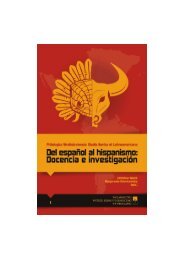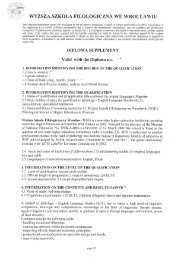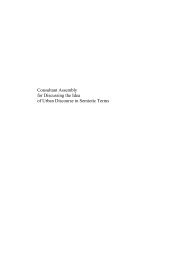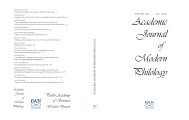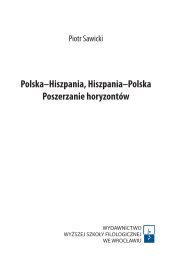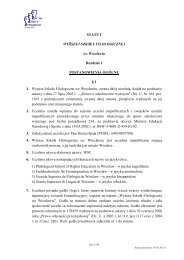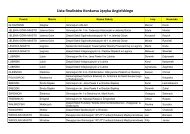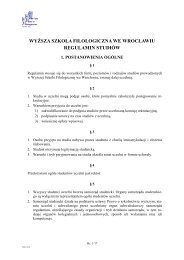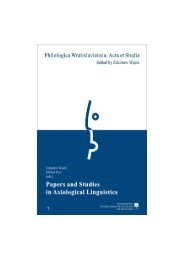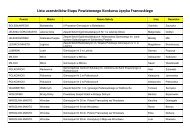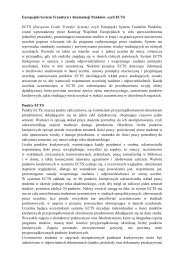s - Wyższa SzkoÅa Filologiczna we WrocÅawiu
s - Wyższa SzkoÅa Filologiczna we WrocÅawiu
s - Wyższa SzkoÅa Filologiczna we WrocÅawiu
Create successful ePaper yourself
Turn your PDF publications into a flip-book with our unique Google optimized e-Paper software.
222<br />
Aleksander Sz<strong>we</strong>dek<br />
– Relations, expressed mostly by verbs and adjectives, are abstract, and can<br />
be conceptualized as objects;<br />
– Objects are not subject to further metaphorical conceptualization and thus<br />
constitute the ultimate source domain.<br />
5. Language acquisition<br />
Gentner (1982) and Gentner and Boroditsky (2001) convincingly argue that<br />
nouns are acquired before verbs. They offer an analysis of language data, as<br />
<strong>we</strong>ll as a cognitive explanation. Gentner and Boroditsky call upon earlier experimental<br />
research (discussed in the work of Gentner 1982) that sho<strong>we</strong>d that<br />
nouns predominate in early production and comprehension and children learn<br />
object reference readily. What, ho<strong>we</strong>ver, is most interesting for the purposes of<br />
the present paper is Gentner’s (1982) explanation in terms of natural partitioning<br />
and relational relativity.<br />
Referring to natural partitioning, Gentner (1982: 324) wrote that “there are<br />
in the experimental flow certain highly cohesive collections of percepts that are<br />
universally conceptualized as objects, and … these tend to be lexicalized as<br />
nouns across languages. Children learning language have already isolated these<br />
cohesive packages – the concrete objects and individuals – from their surroundings”.<br />
Furthermore, on relational relativity he argued that “when <strong>we</strong> conceptualize<br />
the perceptual world, the assignment of relational terms is more variable<br />
crosslinguistically than that of nominal terms … Predicates show a more variable<br />
mapping from concepts to words” (Gentner 1982: 323–325).<br />
6. Final conclusions<br />
All of these phenomena indicate the primacy of nouns over verbs, but there<br />
is a difference bet<strong>we</strong>en their role in selectional restrictions, objectification, and<br />
language acquisition, on the one hand, and in FSP on the other hand. The former<br />
three are based on the cognition of objects in the material world, following<br />
the sharp distinction bet<strong>we</strong>en the material and phenomenological worlds. The<br />
latter is a context sensitive phenomenon affecting concrete and abstract nouns<br />
alike. I would like to suggest that the FSP behavior is a later development in the<br />
history of the language following a primeval distinction bet<strong>we</strong>en physical and<br />
abstract entities, the latter’s conceptualization as physical objects, and then<br />
both, physical and abstract entities being represented by nouns. Thus, the reference<br />
of abstract nouns is an extension of the reference of the concrete nouns.



